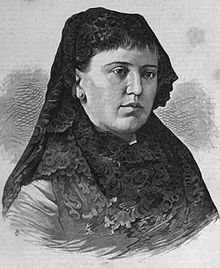Born into a family of aristocrats, Rosario de Acuña y Villanueva inherited the title of Countess, which she never used. Her childhood, during which she enjoyed a perfect education, was marked by vision alteration that worsened to almost absolute blindness. Her early literary vocation first manifested itself through poetry: “La vuelta de una golondrina” [The Return of a Swallow] was published in 1875; one year later, “Ecos del alma” ([Echoes of the Soul], 1876) consecrated her as a poetess. She contributed to various publications and, from 1882 onwards, to El Correo de la Moda [The Fashion Mail], a women’s newspaper in which she expressed her revolutionary ideas. Though she did not despise the narrative genre − the tales of “Tiempo perdido” ([Lost Time], 1881), the novel “El crimen de la calle Fuencarral” ([The Crime of Fuencarral Street], 1889) −, it was nevertheless through theatre that she became famous: her historical drama “Rienzi el tribuno” [Rienzi the Tribune], a plea for freedom, proof of boldness at the time, was performed in Madrid in 1876; “Tribunales de venganza” [Courts of Vengeance], in 1880. In 1884, she was the first woman to occupy the chair of the Scientific, Literary and Artistic Athenæum of Madrid. She distanced herself from her husband, Rafael de la Iglesia, whom she ended up leaving, and surrounded herself with free thinkers, closer to the cultural circles of republican obedience. In 1886, she met Carlos de Lamo Jiménez, who became her companion; the same year, her initiation in a Masonic lodge in Alicante sparked controversy which increased in 1891, with her new dramatic play, “El padre Juan” [Father Juan]. Success was immense, but the anticlericalism of the play scandalised conservative circles: the performances were suspended. She moved to Gijón (Asturias) in 1911 and once again found herself at the centre of controversy when her reflections on the relationship between religious education and macho behaviour, published in L’International in Paris, were repeated in Barcelona’s El Progreso. She went into exile in Portugal, until she obtained King Alfonso XIII’s grace in 1913. Upon her return to Gijón, she actively participated in the literary and cultural life of the city, becoming a symbol the fight for freedom.
